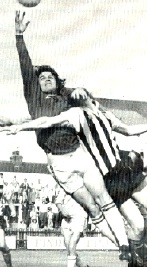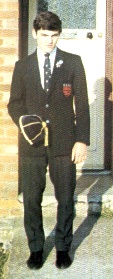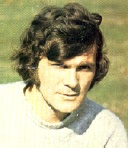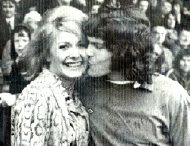
Steve Death
Born Elmswell, September 19, 1949; died 2003
Steve Death is a true Reading legend. In truth he is a true footballing legend. While he never played for Reading outside the bottom two divisions he gave the club magnificent service for over a decade and provided every Royals fan who saw him with a store of wonderful memories and a hero to worship long after he had stopped pulling on the green jersey.
Death played throughout the 1970’s for Reading and while his list of “achievements” may not look that impressive on paper he did more than keep goal for the club, he gave it an identity beyond the immediate outskirts of Elm Park.
Through his name, his performances and his remarkable stature Steve Death came to personify Reading FC for thousands of fans up and down the country who saw him in action against their own clubs.
Steve Death came to prominence as a schoolboy goalkeeper of remarkable promise. The traits that would characterize his goalkeeping throughout his career were already apparent when he was selected for the England Schoolboys squad in the 1964-65 season.
The youngster combined sound positioning and real agility with extreme bravery. Even as a schoolboy Death was not the biggest but this seemed fairly inconsequential at the time. It was natural to assume that he had some growing left to do yet.
Competing with Steve Death for the goalkeepers’ jersey in that England side was another youngster who was also not the biggest, a boy by the name of Peter Shilton.
Between them they shared the goalkeeping duties for England that season with Death keeping goal home and away against Wales and away from home against West Germany. Death did not concede a goal as England gained a draw and a victory against Wales and a resounding 3-0 win in Germany.
 It is tempting to draw comparisons between the two keepers and wonder why one became world famous and the other was restricted to being a legend in Berkshire but the easy conclusions to draw are not necessarily correct.
It is tempting to draw comparisons between the two keepers and wonder why one became world famous and the other was restricted to being a legend in Berkshire but the easy conclusions to draw are not necessarily correct.
Shilton’s absolute commitment and dedication to becoming the best goalkeeper he could be, and he aspired to being the best in the world from an early age, is the stuff of legend. The stories of Shilton hanging from the bannisters at home for hours on end in the hope of gaining a vital inch or two to his frame, of being fed on the finest steaks in bid to improve his physique, of the hours of painstaking training are ones which you would not readily associate with Steve Death.
While Shilton was perhaps dangling from a bridge Death was more likely to be off somewhere sneaking a crafty fag and certainly not taking things as seriously as young Peter.
The temptation to conclude that Shilton prospered to a much greater degree because of his superior dedication is very obvious but this would surely be unfair on Steve Death.
While he was a very different beast to Shilton he could not be accused of shirking training in any way and while it is a fact that he never did grow tall enough to be the common or garden goalkeeper this was surely just one of mother natures’ little whims rather than any disinclination on his part to hang from things or his obvious liking for a cigarette.
Not surprisingly there were several top clubs interested in Steve Death, all anticipating several more inches in height to be forthcoming no doubt, and it was West Ham United who made the first positive advances. Death progressed from schoolboy terms to youth team status and eventually full time professional.
In all he would spend five years at Upton Park. I wonder at what stage he, and the management, gave up on him advancing a little closer to the six foot mark.
Throughout his career, records of Steve Death’s height vary somewhat but the most reliable information suggests that he stood half an inch over five foot seven. Not the height one would expect of a goalkeeper and a height that would require a goalkeeper to be of special talent to go on to make a real mark in the game.
 There can be no question that Death’s height counted against him at West Ham. The club had two good, but not great, goalkeepers ahead of him in Bobby Ferguson and Peter Grotier and Death had the ability to challenge them for the job. Unfortunately it was never really likely that Ron Greenwood, or any other first division manager, would want to place his teams’, and his own, future in the hands of a keeper that small.
There can be no question that Death’s height counted against him at West Ham. The club had two good, but not great, goalkeepers ahead of him in Bobby Ferguson and Peter Grotier and Death had the ability to challenge them for the job. Unfortunately it was never really likely that Ron Greenwood, or any other first division manager, would want to place his teams’, and his own, future in the hands of a keeper that small.
Steve Death would play only one first team game for the Hammers, an end of season affair at Manchester City in 1969. City had just won the FA Cup and there was a relaxed atmosphere around Maine Road.
The debutant had a relatively quiet time as his side gained a 1-1 draw, Glyn Pardoe being the man to beat him. It might have been his only game for the Hammers but he shared the pitch with a cluster of the clubs’ best known players; Bonds, Lampard, Moore, Peters, Redknapp, Brooking and Hurst were all on duty that day as well.
It was obvious there was little chance of Steve Death getting a run in the West Ham first team and early on the following season he took the opportunity to go on loan to third division Reading. The term was originally intended to be for three months but in effect Death would never really return to West Ham.
The newcomer made his Reading debut in a 1-0 home victory over Brighton and immediately got the locals talking. It was impossible not to comment on his size and wonder how he could possibly keep goal effectively.
By the end of the game those present were beginning to understand. The local press announced that Death was “an insignificantly built bundle of daredevil energy”, an apt summation.
Doubts may well have resurfaced after Steve Death’s next game at Southport when the team lost 6-2 but from there on the team went on a good run of form and the new goalkeeper was able to cement his place and demonstrate his ability to handle himself at this level.
His immediate popularity with the Elm Park crowd was confirmed at the end of the season when they voted Death their player of the season and the club ended on a high, in 8th place, after an 8-0 revenge drubbing of Southport in the last game of the season.
Death’s future was uncertain at the beginning of the next season with his situation at Upton Park evidently not promising but the clubs’ £20,000 valuation of him a bit rich for the far from flush Berkshire club.
Again this was a measure of Death’s ability. That fee was pretty big for a third choice keeper and would represent Reading’s record outlay if they were to go ahead and do business.
The club undoubtedly wanted to have this man in their side, however.
Steve Death was with the club during their pre-season although a permanent move had still to be settled. Reading were involved in the Watney Cup and met Manchester United in a televised game at Elm Park.
Although Reading lost 3-2 Death gave an inspired display which hardened the clubs’ desire to keep him but did them no favours in respect of negotiating a fee. Rather than risk other clubs coming in Reading agreed to the £20,000 asking price and finally had their man for keeps.
 While the directors might have been breaking out into cold sweats at the cost there is no doubt that Steve Death would go on to ensure that it was money wisely spent.
While the directors might have been breaking out into cold sweats at the cost there is no doubt that Steve Death would go on to ensure that it was money wisely spent.
His first season as a true Royal would be a trying one, however. In a struggling team, eventually relegated, Death conceded goals at over two goals a game and the side took some fearful beatings. Bury were especially brutal putting five past the exposed keeper both home and away.
Despite this there was no doubt that Death was proving himself not only the clubs’ best goalkeeper at the time but the best one in most fans’ living memory.
While there were inevitably times when his lack of inches counted against him Death had a remarkable spring and elasticity which allowed him to reach things many other keepers might not have been able to get to. His positioning was also almost always sound.
The chief characteristic of his goalkeeping was probably his bravery, however.
Although small Death was never one to stay on his line and hope his defenders would deal with things. If he thought a cross was his he would come out to meet it no matter who might be challenging him for it.
He was also quick on his feet and surprised many forwards who had broken clear and were considering their options by suddenly ploughing down at their feet to rescue the ball, often taking heavy knocks himself in doing so.
Steve Death was also old school in favouring the bare knuckle approach to goalkeeping. Maybe on a really slutchy pitch he might slap on a pair of gloves but in general he was happy to go out there and get a real feel for the ball.
Reading struggled again the next season in division four but Death’s growing authority was displayed as the club again ended up featured in a televised game. Having reached the 4th round of the FA Cup the club were drawn at home to Arsenal and Death was brilliant as the Royals threatened to cause an upset.
Eventually they would go down to a 2-1 defeat but only after Death was finally beaten by two shots deflected by teammates.
The 1972-73 season was one of Steve’s finest and from this point on he would be Reading’s undisputed number one for the next nine seasons. Ever present in the league Death also turned in what many Reading fans consider to be his finest ever display for the club.
Having again reached the 4th round of the FA Cup Reading had to travel to Sunderland who, although only a second division outfit, were a very strong side indeed.
Steve Death was truly inspired as he stopped everything thrown at him by an almost totally dominant Sunderland. Then Reading grabbed the lead and a big shock was in store. The pressure on the visitors grew increasingly intense and still Death resisted everything the home side could throw at him.
As often as he clawed a ball seemingly beyond him to safety he was diving into a ruck of players to rescue his side.
Finally an equaliser did arrive and, tragically, Death was at fault. It was not a glaring mistake, Ian Porterfield drove in a fierce cross shot and the over worked keeper was unable to hold it enabling Dennis Tueart to slot home.
To most observers it had hardly seemed like an error and given his performance until then nobody was about to apportion blame. No-one except Steve Death himself. It was a moment he could probably never quite forget and he always felt as though he had let his teammates down because of it, despite the fact that everyone else left the game hailing one of the finest displays of goalkeeping they had ever seen.
Goals from Dave Watson, Tueart and Bobby Kerr ensured that Reading didn’t come close to scaring Sunderland again in the replay and the story ended with the Wearsiders going on to lift the cup with their famous Wembley victory over Leeds United.
Despite having a decent side and a consistently excellent goalkeeper in Steve Death the Royals were unable to escape the 4th division until the 1975-76 season.
Ironically this was the first season since 1970-71 when Death actually had to miss a significant number of games. It was inevitable, really, that Death would suffer a serious injury at some stage given his total disregard for his own safety and the moment finally arrived in an encounter with Hartlepool at the end of February.
Death had his jaw broken in three places by a ferocious challenge but not only managed to see out the remainder of the game but also played at Huddersfield three days later because his deputy, John Turner, was also injured.
When Turner was fit, however, Death had to sit out the last 14 games of the season, a bitter personal disappointment as Reading clinched promotion without him.
There was further disappointment as the club suffered an immediate relegation back to the 4th division and the following season Death again had to sit out the last couple of months of the season after suffering another bad injury, this time in a game at Crewe.
This injury must have been a bad one as on this occasion Death actually had to leave the field, the only time injury forced him off in the 500+ games he would eventually play for the club.
There would be nothing disappointing about the next season, however. Steve Death was ever present in both league and cup, a total of 57 games, as Reading claimed the division four championship in 1978-79.
Death gave notable displays in the League Cup as Reading defeated 1st division Wolves 1-0 in the 3rd round and was then even better as Southampton were held to a goalless draw at Elm Park in the 4th. Another fine display at the Dell could not prevent a 2-0 defeat but as the club pressed on towards glory in the league a remarkable record lay in store for Reading and Death.
On the 24th of March Rochdale inflicted Reading’s last league defeat of the season on them with a 64th minute goal from Bobby Hoy at Spotland.
There were 11 games remaining and not only did Reading not lose any of these, Death went the entire run without conceding a goal.
Grimsby, Port Vale, Crewe, Portsmouth, Bournemouth, Aldershot, Hartlepool, Darlington, Halifax, Wimbledon and Port Vale again all failed to find a way past the Reading keeper and not only had the club won promotion but their goalkeeper had set a new Football League record for number of minutes without conceding a goal.
I suppose it’s only fair to give a mention to Gary Peters, Mark White, Martin Hicks and Steve Hetzke, the men in front of him, and by the time he was breached in the 29th minute of the opening game of the following season Steve Death had kept his goal intact for a staggering 1,103 minutes.
It somehow seemed inevitable that when the goal arrived it came from one of his own, a Stewart Henderson own goal finally getting past him.
This was a much happier return to the higher level, however, with Reading acquitting themselves well and finishing in 7th place with Death once again ever present.
In November of 1979 Steve Death was awarded a well deserved testimonial with his old West Ham manager Ron Greenwood, now the England boss, taking a Young England XI to Elm Park as opposition. Allegedly Death made his partner pay for her ticket to watch this game and I don’t know why but I certainly hope that story is true.
Over 7,000 others certainly had to pay for theirs and the crowd, above the seasons’ average, was no more than his contribution to the club had merited.
Death kept his place until the last half dozen games of the 1980-81 season before losing his place to Ron Fearon who would remain in possession of the goalkeepers’ jersey at the start of the following season.
Death was recalled in February 1982 but having enjoyed a 4-0 victory over Millwall in his first game back the next two fixtures brought a 6-1 defeat to Huddersfield and a 3-3 draw at home to Doncaster.
Fearon was back in after that and Death had played his last game for the Royals.
Steve Death was only 32 at the time but unlike most keepers the advancing years did make things more difficult for the diminutive keeper. Death relied on his agility, his reflexes and his speed more than other goalkeepers. These attributes were vital in allowing him to make the saves that his height should have prevented him from pulling off.
When these powers began to wane all the experience and know how in the world were not going to compensate for his lack of inches.
In making well over 500 first team appearances, however, Death could be well pleased with his career with Reading, with his contribution to the club and lower league football in the 1970’s generally.
His personal glory amounted to two promotions from the 4th division, 3 England schoolboy caps, 4 player of the season awards with Reading and twice being selected in the PFA 4th division team of the season. It was his unstinting service and wonderful consistency for his club that Death had most reason to be proud, however.
Steve Death basically disappeared from the public eye on finishing his playing career, something that fitted in with the general perception of him as basically a shy man. His low key career with Reading also suggests a man happy to stay out of the limelight yet his character was perhaps more complex than many realised.
Despite his unstinting loyalty to Reading, Steve Death was prepared on occasions to stand up to the club if he felt he was being mistreated and despite his devotion and sterling service to Reading he never allowed football to take over or control the way he lived.
For a man who never concealed his love of a cigarette there was the grim reality of a battle against cancer to face later on in life which he would eventually lose at the age of 54.
You got the impression, however, that Steve Death was not the type of man to complain too much about the hand dealt him by fate or to repine over the choices he had made in life.
His legacy is a footballing career of indisputable merit and an assured place in the history of Reading Football Club.
Steve Death’s Career Statistics
CLUB GAMES GOALS
West Ham United FC 1 0
Reading FC 471 0
TOTAL 472 0

Fantastic goalkeeper, watched him during the 1978/79 season when Reading won the 4th Division championship. Despite being fairly small for a goalkeeper he made up with superb agility, reflexes & bravery!
I was at the rochdale v reading match when rochdale won on last day of season I think, tony buck was rochdale’s centre forward and the headline in rochdale observer that was Buck faces Death. Yes steve death was a brilliant professional so sorry to learn of his early passing. RIP